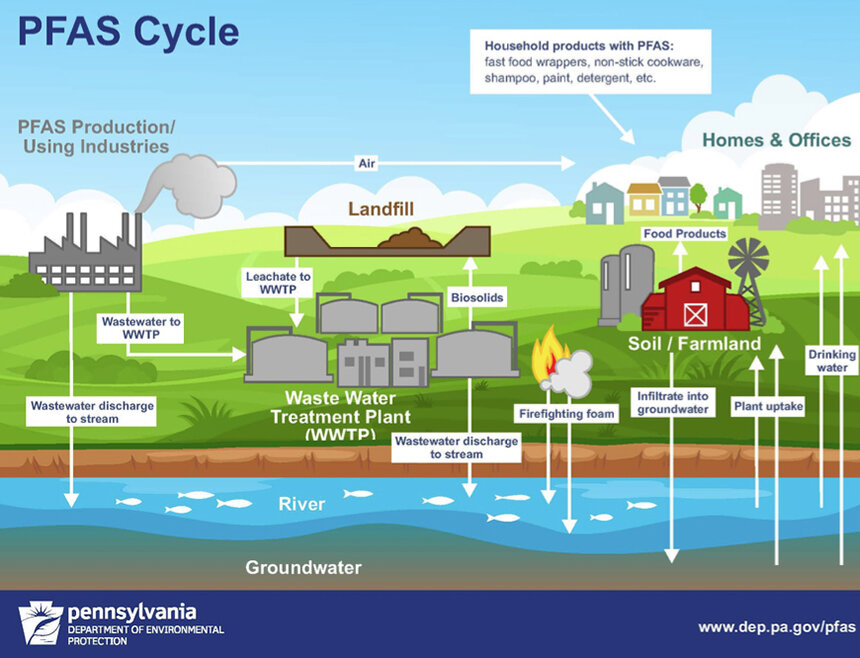Former Middle-School Teacher Keeps Watch for Idling Vehicles
Excessive idling spews pollutants and wastes some 6 billion gallons of fuel annually
November 12, 2021
JAMESTOWN, R.I. — If you leave your car or delivery truck idling along Conanicus Avenue near the intersection of Narragansett Avenue, there is a good chance you will be visited by Sharon Gold.
Since her retirement from teaching seven years ago, helping put an end to what she sees as unnecessary and unfailing idling has become her latest environmental cause. She said it should be a relatively simple habit to break. She has no problem telling offenders as much.
From her fifth-floor apartment in the former Bay View Hotel, Gold has a bird’s-eye view of the “downtown” Jamestown waterfront. She sees plenty of motorists park and leave their vehicles idling as they enjoy the picturesque view. She watches delivery trucks idle as their drivers drop off parcels. She has called their corporate offices to call out their polluting ways. She is routinely told the drivers are supposed to turn off their truck’s engine.
Gold approaches many of these motorists — sometimes in her sweatpants or pajamas — and politely asks them to turn off their engines, explaining the environmental and health impacts of idling and noting the money they could save by turning off their vehicle’s engine. She often hands them literature with more information about the health and financial benefits of curbing idling.
Not every driver embraces the 74-year-old’s affable appeal. Some note they didn’t realize the impact and turn off their engines. Others tell her to move away from their vehicle or roll up their windows and keep idling. She’s been told “it’s my right to idle,” “I can’t shut off the engine because I have a cold,” and “my dog is in the car.” The most crass response was from an older gentleman who said, “I’m going to die anyways, so why do I care?”
Gold also has found many people, including those elected to public office, are just resigned to the belief nothing can really be done to address the problem. A drive-thru society has only reinforced the concept that you need to keep your engine running.
“Protecting the environment, even by doing something as simple as turning off your engine, isn’t part of our value system,” said Gold, who drives an electric vehicle but also relies on her feet and the bus to get around. “We idle here, we idle there, we idle everywhere.”
The New York City native moved to Rhode Island in 1995, drawn by the Ocean State’s coastline and open spaces. She moved from Wakefield to Jamestown in February and spent four months working to get the town to adopt an anti-idling resolution. It didn’t happen until she relented and had any mention of enforcement removed from the document.
So last month, for the second time in three years, she got a Rhode Island municipality to pass an anti-idling resolution. The Town Council unanimously approved the measure. It was passed without discussion.
The resolution lists ways for Jamestown to support anti-idling: encourage drivers of gasoline- and diesel-powered vehicles to turn off their engines; maintain public vehicles to “eliminate any visible exhaust, and comply with annual inspection requirement for those vehicles” and ask town employees to “avoid idling unnecessarily on and off worksites;” educate the public about the health, environmental, and economic impacts of idling; designate idle-free zones.
In 2018, the South Kingstown Town Council also unanimously passed a similar resolution. According to the resolution, like a policy passed by the Town Council six years prior, all non-public-safety town vehicles are prohibited from idling for more than 5 minutes.
Gold also tried to get the Narragansett Town Council to pass an anti-idling resolution, but the town never responded. With support from Sen. Susan Sosnowski, D-South Kingstown, however, she got the Senate to pass an anti-idling resolution a few years ago.
Since 2007, Rhode Island law has prohibited excessive idling — 5 consecutive minutes in any 60-minute period — by heavy-duty diesel vehicles. It’s a fineable offense, but few if any tickets have ever been issued.
Three years ago the state departments of environmental management, health, and education enlisted the support of local school districts in protecting students and their bus drivers from breathing excessive amounts of diesel exhaust emissions.
The agencies, in a joint letter to all Rhode Island school superintendents, asked the school districts to enforce state air pollution control regulations that limit school bus idling.
Diesel exhaust from idling school buses can pose a health risk to both students and the drivers, according to the Rhode Island Department of Health. As school buses idle while waiting for students, the diesel exhaust concentrates at ground level and can enter both the passenger compartments of the buses and the school classrooms through building ventilation systems.
Diesel exhaust is hazardous to human health, is carcinogenic, and is particularly harmful to children and seniors. Tiny particles in diesel exhaust can lodge deep within the lungs, where they can trigger asthma attacks and stunt lung growth in children.
Diesel exhaust is a complex mixture of thousands of gases and fine particles — commonly known as soot — that contains some 40 toxic air contaminants, including many known or suspected cancer-causing substances such as benzene, arsenic, and formaldehyde. It also contains other harmful pollutants, including nitrogen oxides, a component of smog.
Despite the well-known adverse impacts on human and environmental health of needlessly allowing fossil-fuel engines to idle, getting motorists to simply turn off their engines is a monumental task. Most have an excuse at the ready, as Gold has discovered.
The former middle-school teacher who often incorporated environmental protection into her lesson plans said the idea behind the resolutions was to help people understand the seriousness of this issue, from both a public-health and environmental perspective.
She understands resolutions look good on paper and seldom make a difference, but she had hoped they would lead to anti-idling signage and more community awareness about the dangers of idling. They haven’t, as far as she can tell.
Researchers estimate that idling from heavy-duty and light-duty vehicles combined wastes some 6 billion gallons of fuel annually. About half of that is attributable to personal vehicles, which generate about 30 million tons of carbon dioxide every year just by idling, according to the U.S. Department of Energy (DOE).
The federal agency notes idling reduces a vehicle’s fuel economy, costs money, and creates pollution. Idling for more than 10 seconds uses more fuel and produces more emissions that contribute to smog and climate change than stopping and restarting your engine does, according to the DOE.
While the consequences of idling may be limited on a per-car basis, the impact of some 250 million personal vehicles in the United States accumulates quickly. The DOE notes eliminating “unnecessary idling of personal vehicles would be the same as taking 5 million vehicles off the roads.”
Excessive idling, however, is not restricted to personal vehicles. Buses, taxis, Ubers, police cruisers, ambulances, construction equipment, and delivery trucks all contribute to unnecessary climate emissions and adverse public-health impacts.
The Environmental Protection Agency has classified diesel exhaust and particulates from gasoline engines “as likely to be carcinogenic to humans.”




Is it not a violation to leave any idling vehicle un-attended? I remember many years ago that the Bristol police were issuing tickets at one particular Dunkin Donuts for this. You may have noticed that US Post Office deliveries ALWAYS shut the vehicle off when left.
Good for Ms. Gold!! I feel her frustration!! Such a simple step for an individual to take in the climate crisis. I would add that there is often a noise component to idling. As Ms Gold knows, incorporating environmental protection into lesson plans on an almost daily basis (not just on Earth Day!) goes a long way towards changing attitudes. Hopefully, at $3.50 a gallon for regular gas and an mpg of 0 miles/gal for idling, some people will start to wake up.
WOW! good for her. This is always a pet peeve of mine, but I don’t have the gumption to tell people.
Yay to Sharon Gold. We live near a restaurant and delivery trucks are often idling. I’ve taken it on myself to either tell the driver or to call into the restaurant’s owner to kindly ask him to remind the drivers to shut their engines off. And we’ve frequently let other delivery trucks know the law as well.
Back in 2018, I came across a Massachusetts initiative https://www.mass.gov/files/documents/2016/08/uj/depirkit.pdf, https://www.epa.gov/sites/default/files/2019-02/documents/best_practices_at_schools_flyer_0.pdf and https://www.momscleanairforce.org/wp-content/uploads/moms_clean_air_force_school_air_facts.pdf. Recently, I stumbled upon http://greendrivingamerica.org/ as a result of reading a publication. I too ask people to not idle, but sometimes I stumble upon vehicle idling without anyone in them. ????
Deborah,
Years ago I actually reached into the open window of a pick-up truck that was left idling and turned it off! I’d probably be shot for such a thing today!
I also have told drivers of cars and trucks that it isn’t a good for the environment to idle their vehicles and in fact RI has a law against this practice. I have rec’d the gamut of responses and have even been told that diesel engines put out less CO2 if their engine remains warm. IS THIS TRUE?
And once was told by a driver that her bus might not restart if she shut it down. (That one was for at least 3-4 hours as the passengers were guests at a wedding reception.)
I am the former head of Idle-Free VT in Vermont: an organization that advocated on the specific issue of unnecessary vehicle idling (idling when parked) and currently with Green Driving America, Idle-Free VT’s descendent in California, with a national focus of educating on green driving practices (accelerate and brake smoothly, watch speed, avoid unnecessary idling, etc.), and promotion of low- to zero emission vehicles.
I know Sharon. We have advised and supported each other on the idling issue over the years. She is a tireless advocate in addressing this issue and is making a real difference in Rhode Island to reduce carbon emissions, reduce fossil fuel use, and improve air quality. We know that we can make a difference because maybe half of all drivers are simply not aware of the harm and waste of idling when parked, and can be won over. They will really think about it when told, for example, that idling for more than 10 seconds in a light-duty vehicle uses more fuel and pollutes more than shutting off and restarting the engine. Or that sitting in your car with the engine on while parked is getting zero MPG. Just turn off the key and be idle free! And check out plug-in hybrids and all-electric vehicles. Test drive one. You’ll love it – the future of transportation!
Wayne Michaud